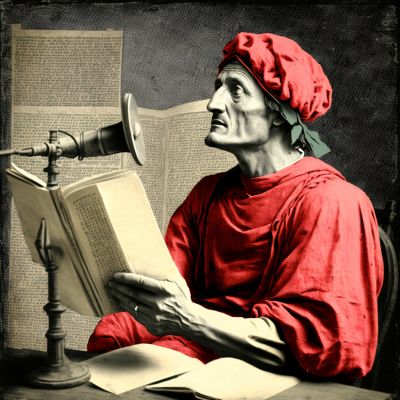This podcast is dedicated to English speakers who would like to know more about Italian Poetry, but don’t speak Italian. You can hear a summary of each poem in English, then the original in Italian, and you can also follow along on our website, where you’ll find resources to help find your way across languages.
https://italianpoetry.it/
episode 5: Tacciono i boschi e i fiumi, by Torquato Tasso
Today we read Tacciono i boschi e i fiumi, by Torquato Tasso.
We have mentioned elsewhere the tight relationship between poetry and music. Madrigals are a great example, being often written to be set to music.
This poem by Torquato Tasso was apparently commissioned by musician Carlo Gesualdo da Venosa1. He might not be a household name today, but he has been an inspiration for musicians from Stravinsky to Frank Zappa to Franco Battiato, due certainly to his extremely modern use of dissonance, but also to having quite a reputation (he caught his wife and her lover… in the act, and killed them on the spot).
No such dissonance nor violence appears in this poem. On the contrary, everything is silent and still in the nocturnal landscape. A profound quietness, perfect for the consummation of a night of love — but the lovers, too, have to keep it quiet!
Tasso evokes a sonnet by Petrarca, that starts with the verse
Or che ’l ciel e la terra e ’l vento tace
but enjoys much more freedom in the composition. First of all in metrical terms: the masterful alternation of endecasillabi and settenari allows for a more fluid and “rippling” sound.
And the content, too, takes more liberties. Petrarca’s sonnet ended with the sorrows of unrequited love. Even the sonnet by Boccaccio that we previously read only hinted at what the women would do, should their lovers arrive.
Here the poet, like Gesualdo’s wife, is caught in flagrante.
One can listen to a modern recording of his music on his Wikipedia page.↩︎
The original:
Tacciono i boschi e i fiumi,E ’l mar senza onda giace,
Ne le spelonche i venti han tregua e pace,
E ne la notte bruna
Alto silenzio fa la bianca luna:
E noi tegnamo ascose
Le dolcezze amorose:
Amor non parli o spiri,
Sien muti i baci e muti i miei sospiri.\ The music in this episode is Tomaso Antonio Vitali’s Chaconne in G Minor for Violin and Piano played by Angelo Xiang Yu and Dina Vainshtein (in the creative commons music collection of the Isabella Stewart Gardner Museum).
